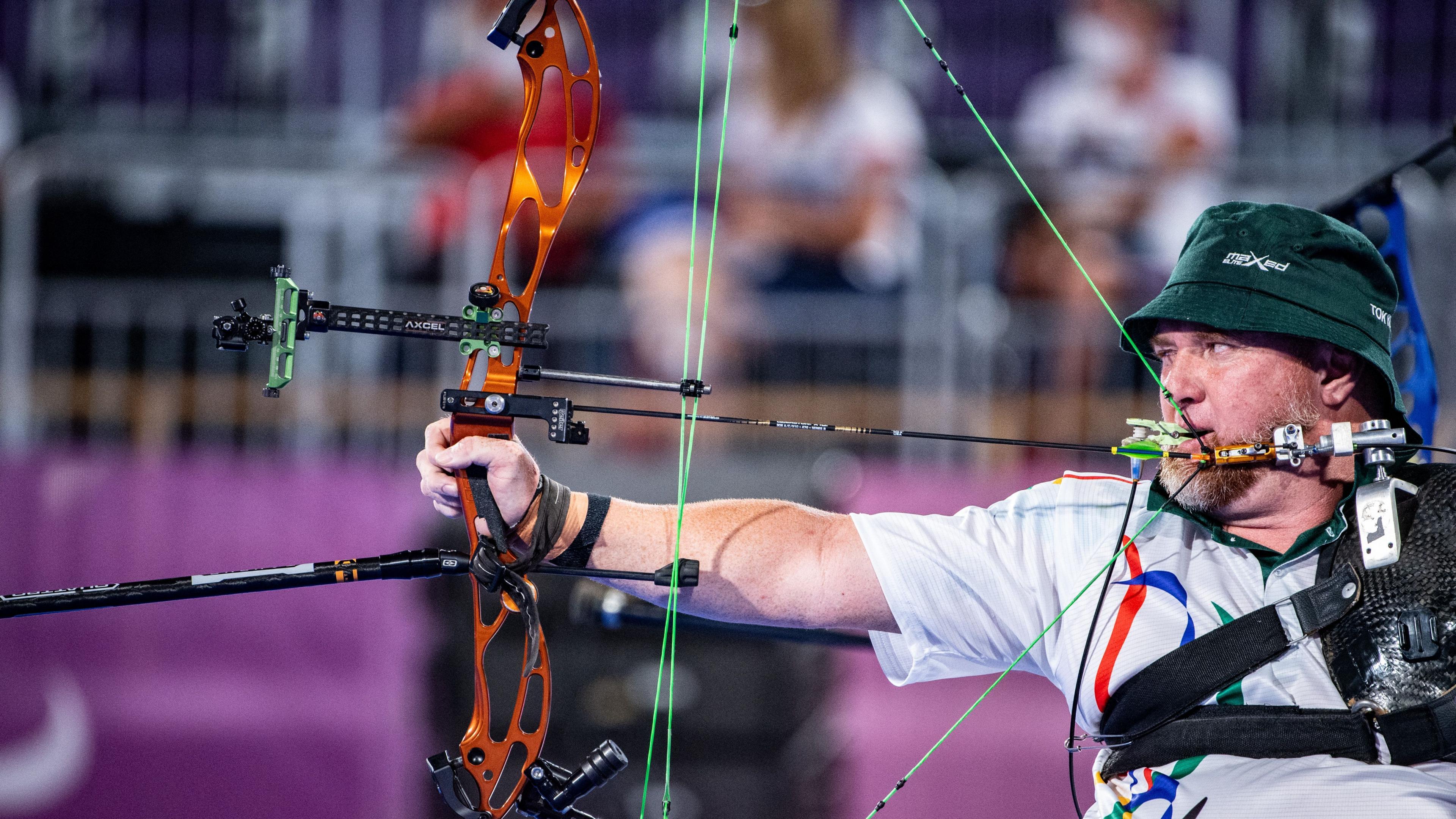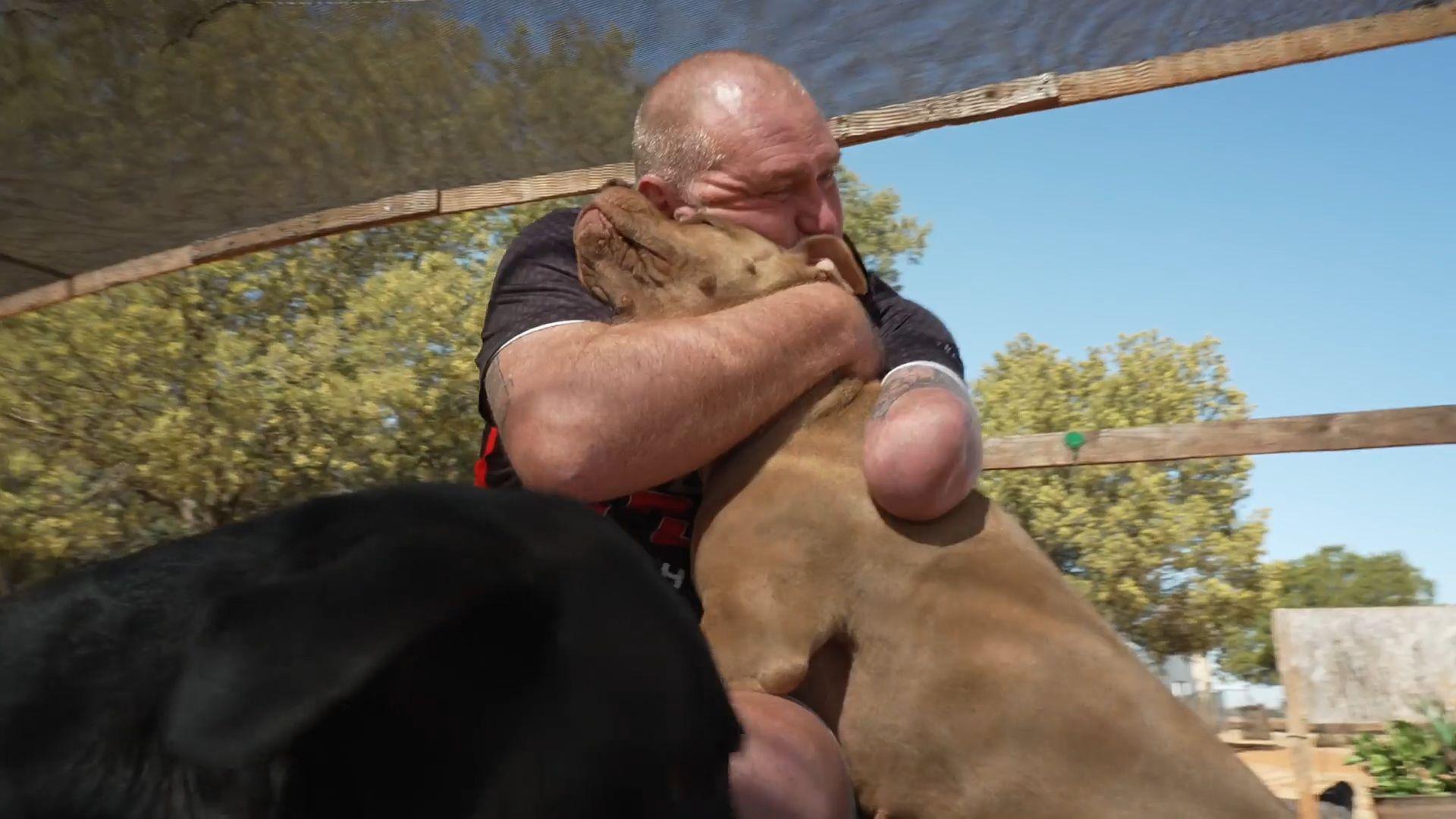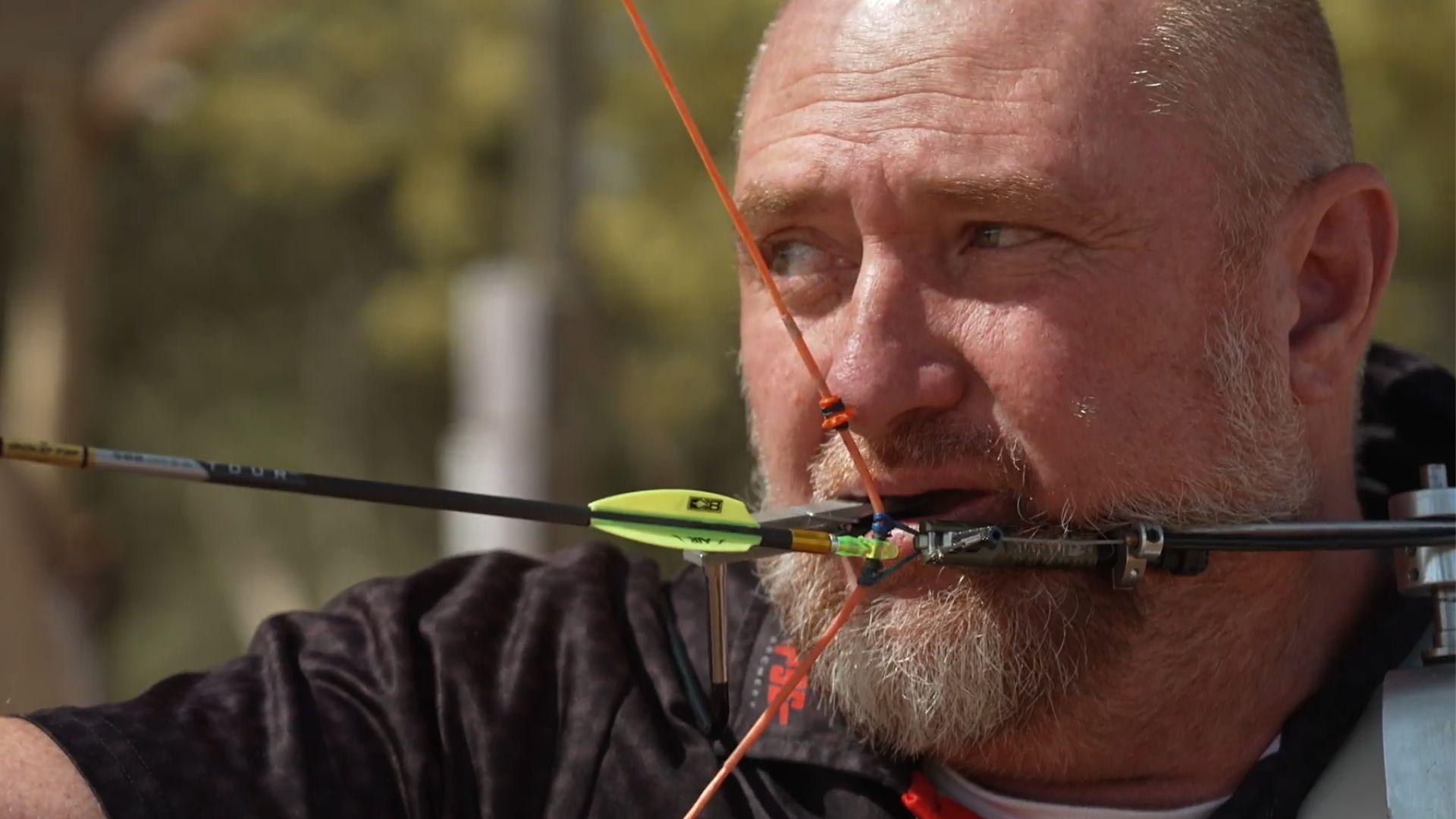Paralysis, amputation and Paralympic archery
Shaun Anderson trains at an archery range he has constructed on his "off the grid" farm in Pretoria
- Published
Content warning: This article contains discussion around suicide and depression.
Shaun Anderson has called sport his “saviour” as he prepares for his third Paralympic Games having overcome two life-changing accidents and experienced depression.
In 2004, the South African archer's left arm was amputated following a motorcycle crash.
Then in 2017, a year after his first Paralympic appearance in Rio de Janeiro, a family fishing trip ended in disaster when a wave crashed into the boat Anderson was steering, tipping it over and trapping him underneath.
“I basically started drowning,” he told BBC Sport Africa.
“I was under the boat, they say for about four and a half minutes. I don't remember much after that. I remember waking up and not having feeling in my legs.”
Damage to his back means Anderson is now paralysed from the waist down.
"You go from being an athlete at the Rio Paralympics, standing and walking in, and then a year later you end up in a wheelchair.
"I haven't put my head underwater since my accident. I haven't been on a boat since my accident. I don't like water whatsoever."
All you need to know about the Paris Paralympics
- Published28 August 2024
'Sport has been my saviour'
It was after the first of his two accidents that Anderson developed his love for bow and arrow.
"My son wanted to try archery," the 51-year-old explained .
"We went into [an] archery shop, we got a bow, he shot and I said to the owner 'I want to shoot as well', and they said I can't.
"I don't believe in the word can't.
"So in the end, I figured out how to shoot and the rest has been history."
Within six months he won his first medal, at an indoor event organised in South Africa by the International Field Archery Association.
"When people tell me I can’t do something, I like proving them wrong.
"I've always been good at sport, I've always loved sport. Sport has been my saviour."
Five years later, Anderson competed at Rio 2016 in the men's individual compound, an event in which archers can stand, sit on a stool or use a wheelchair.
Despite losing his opening match in the round of 32, he took enormous pride from his experience.
"I didn't get to the Paralympics on my good looks," he said jokingly.
"It took a lot of hard work, a lot of sacrifice from my family, myself. I mean, financially massive sacrifices, we had to give up a lot to get me there."
Anderson's plans for Rio were almost thrown into disarray on the eve of the Games when he suffered a burst colon - a suspected after effect of the pain medication taken following his motorcycle accident.
He experienced more trauma on the eve of his second Paralympics when his father died of Covid just weeks before the start of competition in Tokyo.
“I think it put more pressure on me,” an emotional Anderson recalled. “I wanted really hard to do it for him.”
'I felt like I wasn't worthy'

Anderson competed at the 2020 Tokyo Paralympic Games weeks after his father died
It was after losing his first round match in the Japanese capital that Anderson's depression became more serious.
He believes other athletes often put on a "front" to cover up mental health issues, pretending to be "at your best all the time".
"They (people) look at you as an athlete and they think, wow, everything's going great for this guy.
"I just felt like I wasn't worthy of anything anymore and I wasn't good enough.
"I felt like I was a burden to my family. So yeah, I nearly took my own life."
Fortunately, the strong support structures around Anderson helped him.
"I realised that I love my life and I love my family too much.
"I stopped and I realised that I need to ask for help. And I got help."
His advice to others is that they "mustn't be scared to tell people" when they are finding things difficult.
"It's something that will always be with me," he admitted.
"I surround myself with positive people, I keep myself positive. Negativity, I push away. If I'm having a bad day, I'll tell my family."
Off The Grid

Anderson has adopted nine rescue dogs who he says “look after him” when he is “going through a bad time”
Now heading to his third Paralympics, Anderson trains at his rural farm in Pretoria where he rears sheep, pigs and chickens.
Due to issues with power supplies - known as load-shedding, something that has been a regular problem in South Africa - three years ago he decided to go “off the grid”.
“I'm on full solar,” Anderson explained.
“I grow my own vegetables. I have my own fruit trees. We’re basically self-sustainable.”
In Paris, he will compete in the W1 event, a category for athletes with impairments in both the top and bottom halves of their body.
A trigger system featuring a mouth plate allows him to release his arrows.
While the intricacies of his technique are obvious to see, he believes people watching do not always appreciate the hidden challenges faced by para athletes – something he was also guilty of before becoming a wheelchair user.

Anderson is permitted to use mechanical devices when competing
“I never realised how much a buddy from another country who is in a wheelchair had to go through in the morning just to eat or get to the range.
“I have to go through a whole ritual every morning. I've got to get up, I've got to do a bowel program, I've got to clean my bladder.
“Then I've got to have a guy with me the whole time to collect my arrows.”
His homemade range is also now used as a training centre for young archers, and Anderson has coached fellow Paralympian Philip Coates-Palgrave, who competed with him in Tokyo.
“After Paris, my goal is to get a couple of my junior archers to qualify for the Junior World Championships," he outlined.
"In the long-term, I’d like to maybe coach the Paralympic team.”
As an archer, Anderson is used to drawing on both a bowstring and inner reserves of personal strength.
A Christian, he admits that his two accidents did leave him wondering “why me?”, yet he has never been tempted to think of himself as cursed.
"I always believe things happen for a reason.
"I don't always know what are the reasons or what is the big guy's plan with me.
"But if people can learn out of what I've achieved and what I've overcome through all my obstacles, then I've done the right thing."